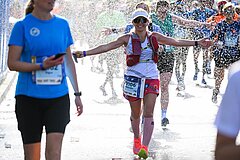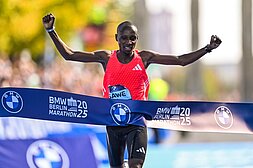“Starting the intensive Phase of Preparation in Good Health” – why a Sports Medicine Check-up is so important right now
In just two months, the BMW BERLIN-MARATHON will start and many runners are deep into their preparation. Motivation is high, training volumes are increasing, and the big goal is coming within reach. Now is the perfect time to take a closer look at your health: Am I truly physically ready for the challenges ahead?
A sports medicine check-up is more than just a precaution — it can form the foundation for a healthy and successful training process. This is also emphasized by Dr. Margrit Lock, Executive Board Member Medical of the BMW BERLIN-MARATHON and its organizer, SCC EVENTS. As a specialist in orthopedics, trauma surgery, and sports medicine, she knows exactly what matters — and explains in the following interview what a thorough sports medical check-up should include.

Dr. med. Margrit Lock @ SCC EVENTS
Dr. Lock, why is a sports medicine check-up so important at the start of marathon training?
A marathon is a high-level endurance achievement, even for well-trained athletes. Especially now, training volume increases significantly. A sports medicine check-up helps to begin training in an individualized and responsible way. We assess whether the cardiovascular system, musculoskeletal system, and metabolism are up to the coming demands. This allows us to identify potential health risks early — or ideally, rule them out altogether. It’s about prevention, not restriction.
What exactly should a sports medicine check-up include, and how is it different from a general health check?
A sports medicine check-up is much more specific. In addition to a thorough medical history and physical examination, it includes a resting ECG and a stress ECG, usually on a bike or treadmill. We also check lung function, blood values and, if needed, perform spiroergometry. This test allows for a targeted assessment of endurance capacity and helps define training zones. Unlike a standard health check, our focus isn’t just on whether someone is healthy but how resilient they really are.
What typical risks can be identified during the check-up, even in seemingly healthy runners?
Endurance athletes in particular can be misled by the feeling, “I’m fit.” Some heart conditions or circulatory problems show no symptoms at first and only become apparent under stress. Undetected infections, blood pressure issues or muscular imbalances may also show up during the check-up.
Our goal is not to discourage anyone from training, but to identify risks early and adjust training if necessary. This helps prevent overuse injuries and ultimately enhances long-term performance.
An important tool in early detection is also the PAPS test, a digital prevention questionnaire for self-assessment in sports medicine. It’s been a mandatory part of the registration process at all SCC EVENTS races for years. We were the first organizers to establish this standard. The aim is to detect potential risks early and encourage targeted medical evaluation.
Many ambitious runners train hard, often despite minor issues. What is your view on the topic of “training load vs. overtraining”?
Training stress is part of the process, no doubt. But those who regularly run with pain or ignore warning signs such as fatigue, sleep disturbances or unusual heart rate responses are risking injury or health complications.
Ambitious runners especially tend to downplay symptoms. Our recommendation: better to get something checked once too often than once too little. Often, small adjustments, like to training structure or running technique, can make a big difference.
Who should definitely get a sports medicine check-up? Are there age groups or situations where it’s essential?
In general, we recommend a check-up for all runners before entering intense race preparation—regardless of age. It’s particularly important for beginners, those returning after a long break, anyone with pre-existing conditions and runners over about 35 to 40 years old.
In these groups, the risk for cardiovascular issues or orthopedic problems increases — issues that might go unnoticed in daily life but become relevant under heavy training loads.
How can a check-up also help make training more targeted and effective?
Through performance diagnostics, such as lactate testing or spiroergometry, we can define individual training zones. This allows training to be managed optimally — not too little, not too much, but efficient and tailored.
Many runners train too much in the “gray zone”, not easy enough to recover and not intense enough to improve. A check-up brings clarity here and ultimately saves time and energy.
And finally: your personal tip for a healthy marathon preparation over the next weeks?
Listen to your body and trust solid data. Good preparation isn’t just about mileage — it’s about quality, recovery, and health.
A sports medicine check-up lays the foundation for that. Those who prepare consciously usually not only reach the finish line more safely but also faster.
Related News
Our sponsors













BMW

BMW GERMANY - A STRONG PARTNER FOR RUNNING.
BMW has been the title sponsor of Germany's biggest marathon since 2011. At this running event, the world's elite come together to top the current best times.
Strength. Endurance. Efficiency. These are not only the most important attributes of a runner, but also apply to BMW's sustainable vehicles. BMW has been setting standards in sustainability for years and successfully demonstrates them at the BMW BERLIN MARATHON. But also before the event BMW accompanies the running community in their preparation and emphasizes the joy of running. With the perennial RUN FOR JOY campaign, BMW, supports the athletes in their preparation - together they make the impossible possible. The lead vehicle, the new BMW i5 supports the runners on the course. It has exactly the qualities needed for a successful marathon run: intelligent and responsible use of resources. And it is precisely with these skills that the all-electric vehicle guides the runners safely, purposefully and in an environmentally friendly manner through the capital.
More than 50 vehicles and around 15 scooters of the C evolution class are part of the fleet of support vehicles provided by BMW for the BMW BERLIN-MARATHON. In addition to the iX as a safety car, the latest i-models from the car manufacturer are also in use as shuttle and organization vehicles. With this commitment, BMW supports the sustainable development of modern technology and the sport of running.
adidas

Everything at adidas reflects the spirit of our founder, Adi Dassler. Improving the athlete’s performance was his goal; today, his legacy continues with the consumer at the heart of everything the adidas brand does.
The number of runners in Germany is constantly increasing. No matter where they come from, they all have the same goal: Improve. Better runners, better athletes and in the end a better version of themselves.
adidas Running has something for everyone – we want help each person achieve their individual goals. What counts is personal development, which goes far beyond the personal best.
Abbott

At Abbott, our 114,000 employees in more than 160 countries are devoted to advancing life-changing technologies that help people achieve their full potential. Our medical devices, diagnostic tools and nutrition products are designed to enable individuals to reach their personal best, however they define it. By sponsoring the Abbott World Marathon Majors, a series of the six largest and most renowned marathons in the world, including the BMW BERLIN-MARATHON, we are not just celebrating the pinnacle of physical endurance and determination – we are reinforcing our commitment to improving lives. The Abbott World Marathon Majors are a testament to health and the human spirit at their finest, showcasing that with the right support and determination, every finish line is within reach.
More on Facebook at www.facebook.com/Abbott and on Twitter @AbbottNews and @AbbottGlobal.
Zalando

Are you ready to take your running to the next level? As the official sponsor of the BMW BERLIN-MARATHON, Zalando is here to help you reach your goals. Running a marathon is challenging enough - you need the right equipment to feel completely comfortable. Our functional sportswear can do much more than just look good: From marathon training to relaxed runs - find your perfect outfit at Zalando and run with us!
GENERALI

Generali Germany has been our partner since 2018. The insurance group is part of the international Generali Group and thus also part of a company that is over 190 years old, its history and its heritage. In 2017, the company launched a new sponsorship strategy - “Generali moves Germany”.
The initiative aims to motivate people to lead active health and environmentally conscious lives. Taking part, not watching, is crucial here. In recent years, Generali has thus become one of the largest and most important sponsors in German running. Running promotes physical and mental health and thus has a preventive effect against numerous common diseases. Moreover, hardly any other sport can be practiced in such a resource-saving and environmentally friendly way. Together with the event organizers, Generali develops programs that make major events demonstrably sustainable: in the areas of environmental and climate protection and social commitment.
About 9 million customers are insured with the companies of Generali Germany, which include the brands Generali, CosmosDirekt and Dialog in the life, health and property/casualty segments. Generali's objective is to be a lifetime partner for its customers, offering innovative, individual solutions and services thanks to an excellent sales network in exclusive and direct sales as well as in the broker channel. Generali Germany is part of the "Germany, Austria and Switzerland" (DACH) business unit, which was newly created in 2022.
ERDINGER Alkoholfrei

ERDINGER Alkoholfrei refreshes all finishers behind the finish line. ERDINGER Alkoholfrei is the ideal beverage after sports: isotonic, rich in vitamins, and low in calories. And ERDINGER Alkoholfrei has only 125 kcl per 0.5-liter bottle! Because a varied and balanced diet and a healthy lifestyle are important!
Revolut

Revolut is a digital bank with the mission to radically simplify finances for individuals and businesses. Founded in 2015 in the UK with the goal of making international money transfers faster and cheaper than traditional banks, Revolut today covers all key areas of finance—from everyday banking and saving to investing and international payments. Over 60 million people worldwide, including more than 2 million in Germany, trust Revolut.
https://www.revolut.com/
Shokz

Shokz is the world’s leading consumer electronics brand focused on acoustic innovation and renowned for its groundbreaking developments in wireless open-ear headphones.
Shokz is committed to exploring new possibilities for the open-ear listening experience, embracing the principle of staying connected to your surroundings and nature, and empowering you to enjoy your music while remaining open to the world.
NORQAIN

NORQAIN – Official Timing Partner of the BMW BERLIN-MARATHON
NORQAIN is once again the Official Timing Partner of the BMW BERLIN-MARATHON!
Precision, endurance, and determination are not only essential to the race – they’re also part of our DNA. Together with the pacemakers, we celebrate the global running community and support thousands of runners on their journey to a new personal best, in line with our motto: My life, my way. At the heart of our presence is the Wild ONE collection – our high-performance sports watch designed for those who dare to push their limits.
We look forward to celebrating the marathon spirit with you!
Blackroll

"BLACKROLL® is dedicated to helping people of all ages, sports levels and lifestyles take their health, well-being and performance into their own hands every day. For an optimal balance between tension & relaxation and a pain-free life full of energy, mobility and sustainable performance.
It all started in 2007 with the first fascia roller. Today, the Healthstyle Company offers a whole range of innovative products and solutions that convince experts in sports and health."
Biotherm

With Skin Fitness, Biotherm offers a complete range of premium skincare designed for active women and men seeking effective solutions for a fitter skin: a skin that looks younger, stronger, healthier, in shape for longer. Combining cutting-edge biotechnology, with Biotech Plankton™, and the power of fitness supplements, Biotherm powers up skin cell metabolism. Biotherm: You Work Out, We Work In.
Maurten

You probably know that you burn carbohydrates when you run – both in training and during the race. And how hard it can be getting the fueling right, without GI-distress.
Our Hydrogel Technology makes sure you get enough carbohydrates without risking the session or race. But there are no shortcuts – science has shown that training your guts makes a huge difference.
VILSA

Naturality meets sustainability
As a mineral water, VILSA accompanies you with refreshing purity and light mineralisation. But that's not all! We are committed to people, animals and the environment: as a family-owned, midsized company in its fourth generation, we see it as an obligation and the core of our company philosophy to stand up for nature and the conservation of our resources in order to preserve them for future generations.
Discover our variety of products and enjoy the natural freshness of VILSA.























![[Translate to Englisch:] [Translate to Englisch:]](/fileadmin/_processed_/a/0/csm_Masse-Start-bunt-laufen_e5ba163bb7.jpg)

![[Translate to Englisch:] Plogging-Aktion von Organisator SCC EVENTS nach dem BMW BERLIN-MARATHON © SCC EVENTS](/fileadmin/_processed_/1/9/csm_Aufmacher_e3273a05ea.jpeg)

